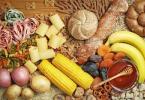What are proteins?
Proteins are high-molecular organic compounds of alpha-amino acids. In order for proteins to digest in the body, they need to be broken down into amino acids, which occurs with the help of various enzymes throughout the passage of the protein through the gastrointestinal tract. This process is long and energy consuming. In the process of assimilation of fats and carbohydrates, the body spends about 5 - 7% of the energy contained in them, and in the process of assimilating protein - 30 - 40%. Often, the energy contained in proteins is only enough to perform the basic plastic functions of the body. And therefore for the assimilation of proteins, the energy of fats and carbohydrates is used. And if they are not enough in the consumed food, then begin to spend fat reserves.
The diet should contain the necessary amount of protein, it helps to improve the basal metabolic rate and does not allow muscle mass to decrease. As a result of the lack of protein in food, the body is forced to use muscle protein. Very often, with improper weight loss (wrong diet), a person loses body weight not only due to fat, but also muscle mass. And then, when he begins to gain weight, most often this is due to an increase in body fat and the percentage of fat content increases. An increase in fat mass and a decrease in muscle mass leads to a slowdown in metabolism, therefore, it is rather difficult to keep the results achieved by puffing.
What is dangerous protein deficiency?
Proteins take part in almost all vital processes of the body. With a lack of protein in children, growth and development slows down, in adults, the work of the liver, endocrine glands, and heart deteriorates, hormones, memory, and work capacity deteriorate.
Protein deficiency reduces immunity, often accompanied by avitaminosis, a violation of the absorption of many nutrients and trace elements. As a result, serious hormonal disorders can develop.
Exercise destroys muscle cells, which can only be restored with protein. The benefits of exercise is manifested only with sufficient protein intake.
Excess protein
If the excess of the required amount of protein in the diet is insignificant, then this will not lead to undesirable consequences. The problems associated with excessive consumption of protein are quite rare, as in our diet it is rather a shortage, but they happen. Proteins do not accumulate in the body, their excess is converted into glucose, as well as nitrogenous compounds that are excreted from the body. Excess protein increases the acid reaction of the body, and this leads to loss of calcium.
Protein uptake
In different foods, the percentage of protein digestion varies. For example, egg white and protein in milk are absorbed by 100%, in beef - by 92%, peas - by 69%, beans - 68%, in oats - by 57%, lentils and peanuts - by 52%, in wheat - by 40 % True, it should be remembered that protein-rich milk, eggs and meat contain a lot of fat. Emphasis should be placed on low-fat cottage cheese and yogurt, low-fat cheese, white meat, veal, soy meat, milk and cheese. Less preferred are dark poultry, red meat, cottage cheese, bacon, salami, ham, and yoghurt with sugar.
Proteins are better absorbed after heat treatment.
You need to lose weight correctly
If you decide to lose weight, while changing your diet, remember:
- Lack of complete protein leads to reduced immunity, hormonal disorders, etc.
- In vegetable and fruit diets, as a rule, not enough protein.
- In low-calorie diets, it is necessary to control the amount of protein consumed in order to prevent a decrease in metabolic processes.
- The protein is long absorbed and lengthens the process of assimilation of carbohydrates, in connection with this decreases the overall glycemic index, which allows longer than to experience hunger.
- High protein foods require more digestion.
- Protein is the only supplier of nitrogen in our body. Insufficient production of nitric oxide can lead to disruption of human organs and systems.
- In order for weight loss to occur due to the burning of fat, not muscle mass, it is very important to consume enough protein.
- Physical activity can harm the body with insufficient protein intake!
- Protein consumption requires more water to digest than other food components. Therefore, in order to prevent
Protein (protein, polypeptide) diets are among the most popular. You can often hear about the benefits of protein foods. But what are the proteins, what is their role and what substances should you use more for losing weight?
After these substances enter the body, it receives a daily rate of amino acids, which accelerate cell regeneration, build muscle mass, make nails and hair stronger, and skin fresh. These substances are important not only for the appearance, but also for the stable operation of all organs and systems.
The norm of protein consumed while losing weight
With their deficiency in the first place losing weight on fruits and vegetables. Weight, of course, on such diets goes very quickly, because the body begins to use its reserves to compensate for the lack of energy.
But such a diet leads to the fact that after some time the muscles lose their tone and the body looks “sagging”.
If you limit the use of proteins, the body will take them from stocks. Since amino acids are the binding material of all elastic tissues, muscles will be the first to suffer. However, this is not at all a reason to oversaturate your diet with proteins, because any substances with excessive use are harmful.
It is recommended to calculate the required amount based on the ratio of 0.5 g of “pure” protein per 1 kg of body weight. If a person goes in for sports or leads a very active lifestyle, then his norm is 2-3 times higher than the received figure.
What are squirrels?
These substances are fast and slow. The first very quickly absorbed by the body, so it is perfect for people involved in sports. Use them before training or immediately after it, because at this time the body needs to be restored.
But protein is not recommended after training for weight loss. That is, a person who is dieting and playing sports should eat 2-3 hours before classes and the same time after them. This measure allows the body to spend more time for fat cells.
Slow body absorbs much longer and at the same time spends more energy, although they are less high-calorie than the first. This type is not suitable for people who want to gain muscle mass, but as an auxiliary product, they are indispensable. However, they are useful proteins for effective weight loss. That they should pay attention to people who want to lose weight.
The most famous representative of the "slow" is cottage cheese. The process of assimilation takes about 6-8 hours.
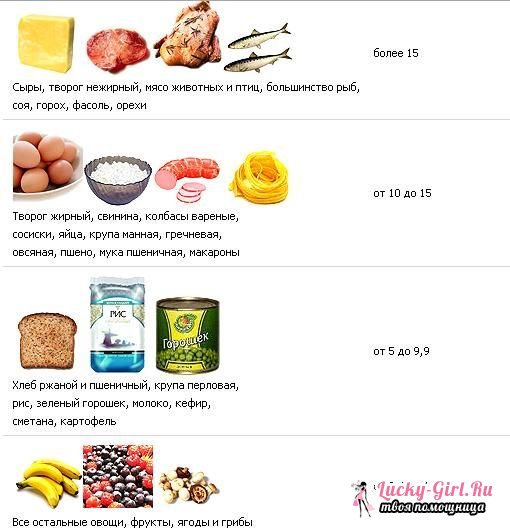
Important role played by the intake of slow proteins. To gain muscle mass, it is recommended to use them at night. While a person is sleeping, the body will calmly digest food, supplying muscles with essential amino acids. In addition, this view is suitable for those who are forced to remain without food for a long time, for example, in the conditions of the working process.
Due to the slow absorption of the product, a person will not feel hunger for a long time, but at the same time the body is supplied with useful substances. In addition, protein for the night is useful for losing weight. It will help burn fat during sleep.
List of foods that can be eaten before going to bed:
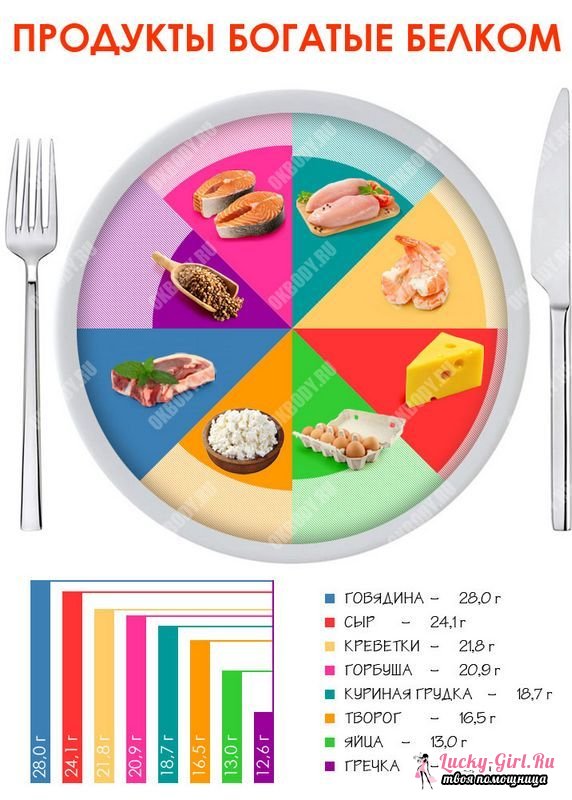
It is worth noting that doctors often recommend eating animal proteins, as they are better absorbed and contain more "pure" proteins. However, allergies can occur when eating a single product. So you need to build a menu so that it is diverse.
Products containing protein and used for weight loss
Immediately it should be noted that not all foods rich in proteins, is useful. The problem is that products containing polypeptides often have a lot of fat. And the latter - the enemy of harmony, besides prevent the body from assimilating the proteins themselves.
The egg white is best perceived and best absorbed. This is due to the fact that the product is low in fat and proteins - fast. But usually it is not recommended to eat more than 2 eggs per day. If a person goes in for sports, then he needs 4 eggs.
No less useful is steamed meat, especially chicken or lean beef. For example, 100 g of fillet contains up to 30 pure proteins. Moreover, such food quickly saturates. It is only recommended to combine it with light side dishes.
The third place is occupied by oatmeal. No wonder oatmeal is recommended for all ages. It contains a lot of slow proteins and carbohydrates, with little fat and calories.
Foods rich in protein of animal origin: meat, poultry, fish, eggs (especially quail), cheese, dairy and sour milk.
Products rich in vegetable protein: vegetables, fruits, berries, mushrooms, grains, legumes, seeds, nuts.
How to use proteins and carbohydrates for effective weight loss
As mentioned above, eponymous diets are in great demand. Products permitted by such methods, well saturated, give strength. Due to this, a person consumes fewer calories and, consequently, loses weight.
The absorption of proteins consumes a lot of energy, so the body takes it from the reserves - fat cells.
However, the main mistake of such weight loss programs is a complete taboo on carbohydrates. The latter are no less important for the organism and when they are deficient, as with the shortage of other substances, it begins to suffer.
During such weight loss, you must follow a few rules:
- Fractional nutrition, that is, food is taken in small portions, but often - about 5 times a day;
- You can not eat only protein foods. It is necessary to combine them with others. Vegetables are well suited for this;
- It is allowed to add a little soy and lemon sauce in food, the rest are prohibited;
- In the first half of the day they consume complex carbohydrates, and in the second - light foods, such as chicken fillet or boiled fish, as an example;
- The main dishes in the diet are - chicken breast, fish, seafood, boiled beef (only 100-200 g each). They are combined with various green vegetables and salads;
- Cooked only by boiling on water or steam.
Isolate of soy protein - an effective remedy for weight loss
This substance has recently been very often used by losing weight, especially in the baking process. What is it and why is it so popular?
Protein isolate is a highly purified form of protein that is practically free of carbohydrates (lactose), fat and cholesterol. It is this characteristic that distinguishes it from ordinary protein, which incorporates the above listed substances.
There is whey, egg, casein and soy isolate. The latter is the leader among losing weight, as it relates to budget options. He is actively included in not only the daily menu, but also in sports nutrition. It serves as an excellent alternative to protein products.
The above information will help you to make your diet correctly and adjust the menu, which will always lead to weight loss. Lose weight properly and success to you in the fight against extra pounds!
Already proven fact that protein for weight loss is a necessary and one of the best components of food, which should be included in any diet. Let's first understand why we need protein at all? What does it give to our body?
Protein (also called protein, from the Greek protos - the first, most important) - is the building material from which all the cells of our body are built. All our organs are protein! You and I are proteinaceous creatures, we are completely composed of protein: muscles, liver, heart, nerve cells, blood, lungs, brain, skin, nails, hair - this is all protein.
A person who eats up his protein standard every day is being built and restored. A person who does not eat up his norm of protein is destroyed.
What is the role of slimming protein?
- Protein, prolonging the feeling of fullness, which is so important when losing weight;
- Accelerates metabolism at rest, maintains muscle mass (burning calories by muscle cells is three hundred times more intense than fat);
- Maintains normal blood sugar levels, in contrast to carbohydrates, which does not give sudden insulin surges. Thus, it can be said that protein helps to get rid of the so-called carbohydrate dependence.
For our health, the biological value of protein is incredible, no matter how many people claim, but our body cannot completely do without proteins. After all, the functions of proteins not only for weight loss, but also for human health are diverse:
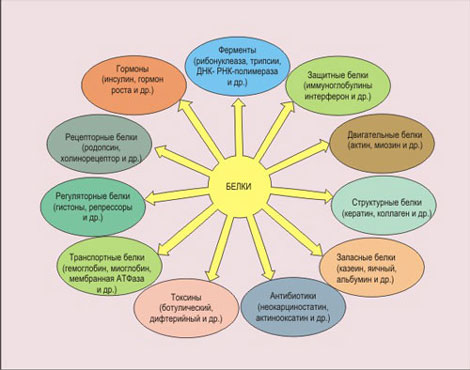
- Building - proteins build every cell of our body, from bones and muscles, to nails and hair. Like dogs and cats, health is a beautiful, silky coat, so we have skin, hair, and nails. Therefore, so that the skin does not sag, especially with a sharp weight loss, you need to eat enough protein per day.
- The production of hormones and enzymes is impossible without proteins.
- Protein "trailers" transport vitamins, minerals, hormones, oxygen into the cells. The lack of protein leads to the fact that all the nutrients are simply disposed of in the toilet. And then the toilet becomes the most golden place in the house. , saturate the body with calcium and minerals, and who will take them to the right place, if not protein?
- Contributes to the maintenance of water balance in the tissues. If proteins are not enough to eat, water does not linger inside the cell and flows through the membrane into the extracellular space. This can lead to swelling.
- All immune cells are protein structure. If there is not enough protein, then our immune system is not able to effectively resist infections.
As you can see, proteins are necessary not only for proper weight loss, but also for the work of the whole organism.
Protein for weight loss is still necessary because much more energy is expended on its absorption by the body than on the absorption of fats and carbohydrates. What gives us another plus in burning extra calories.
In the next article, we will look at which foods contain the most protein, how to make your day menu to provide the necessary amount of protein for weight loss and body shaping. Follow our blog updates!
Proteins are the most important battery for humans. If we do not get proteins, we become weaker and sick.
Today, most people who eat normally and are not sitting on any diet receive adequate amounts of protein. But among the active slimming situation is somewhat different. Since many of those who are striving to lose weight with all their might, begin to unreasonably limit themselves to protein foods. Which is completely wrong.
Below are 4 justifications for why a healthy diet for sustainable weight loss at home must necessarily be partly protein.
Protein is well saturated
Protein food perfectly satisfies hunger and prevents its occurrence. Even with a small amount of protein intake, the person feels full. This is due at once with several features of protein foods:
- proteins inhibit the production of hunger hormone ghrelin
- promote the production of saturation hormone - peptide YY
The extent to which this feature of proteins is important for the process of losing weight can be understood from a recent study. During the survey it was proved that
an increase in protein intake from 15% to 30% of the daily diet allows women who are overweight to eat less calories 441 per day without forcibly restricting themselves to food.
This is what concerns the present desire, that is, a state where a person is weakening and needs support from nutrients. Separately, it must be said about the painful desire for snacks, both during the day and at night.
This aspiration differs from true hunger in that it has nothing to do with the need to introduce nutrients into the body. In this case, we are talking only about the psychological desire to eat, which in its essence is no different from the desire to smoke or take alcohol.
So, it has been established that the inclusion of an additional amount of proteins in the diet makes it possible to significantly reduce the craving for unmotivated meals.
For example, in one experiment, overweight men after they increased the protein daily by 25%, demonstrated a 60% reduction in cravings for snacks during the day and a 50% reduction at night.
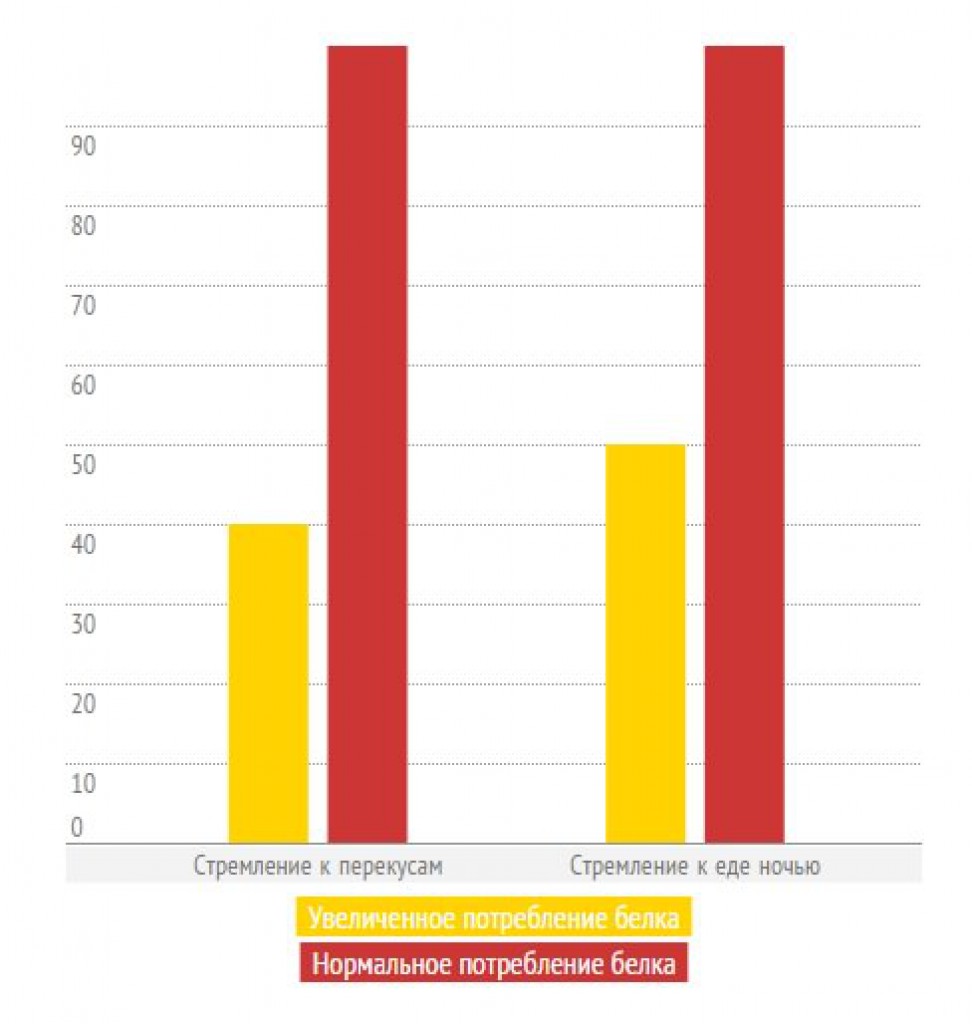
It is believed that this influence of proteins is associated with their ability to normalize the work of dopamine, a neurotransmitter of the brain involved in the formation of various dependencies.
Proteins build muscle
Muscle is a protein formation, and therefore it is obvious that without significant intake of proteins in the body it is impossible to build muscle.
In this case, the need to increase muscle mass is not only in front of young people who want to pump their biceps, but also in front of all those who are on a diet to lose weight.
Very often, getting rid of excess weight is fraught with loss of not unnecessary muscles. To prevent this from happening, any diet must necessarily ensure that the protein component enters the body.
Especially it should be said about the benefits of protein to maintain muscles in good working condition in the elderly. With age, sarcopenia begins - the process of reducing muscle mass. Sarcopenia is inevitable, but it can be significantly slowed down, providing the body with an additional amount of proteins.
Again, this is especially important for people who are losing weight, in which the process of losing muscles goes leaps and bounds, since the side effect of losing excess weight is added to the natural age-related changes.
Proteins increase metabolic rate and accelerate fat burning
This feature of proteins is related to the fact that they possess high thermal effect. That is, their assimilation requires the use of large amounts of energy. Protein food provides the body with the molecules it needs, however, the excess “provisions” are practically not able to be deposited in the form of fat, because they simply burn in the process of digestion.
It is established that a diet with a large amount of protein makes it possible to burn 260 calories more per day than a low protein diet. The same amount of calories burns during an hour of intense training.
Proteins improve bone density
There is a popular belief that protein nutrition, especially of animal origin, leads to an increase in bone fragility.
This is due, they say, to the fact that proteins are "acidic products" that lower the pH of the blood. And to normalize the pH, calcium leaves the bones, which leads to their increased fragility.
It is important to say that this whole theory, just like the alkaline diet itself, does not have any scientific evidence, because the pH of the blood is constant. If he really shifts to the acidic side, the person simply dies (more about this you can read).
But there is a mass of epidemiological data, according to which, protein intake is necessary to retain calcium in bones. It has been established that people whose diet includes the normal amount of protein, including animal, have stronger bones than those who try not to eat proteins.
This difference is particularly noticeable in older people, especially in women during and after menopause, who constitute the main risk group for osteoporosis.
Why is it important to remember losing weight?
Firstly, because women of pre- and menopausal age often need weight loss.
Secondly, because even young people, exhausted by strict diets, can experience accelerated calcium loss.
How much protein is needed per day?
According to common nutritional recommendations:
- the average man (average height, average weight), leading a sedentary lifestyle, must consume at least 56 grams of protein per day (preferably 91 grams)
- average woman - 46-75 grams
It is obvious that the selection of this incomprehensible average person is not quite correct. And the need for proteins depends on very many indicators. So the large role is not played by the body weight itself, but by the percentage of muscles in this mass.
So for people who play sports, do physical work or just walk a lot, protein intake should be more. In this case, the calculation is based on body weight: 1.2-1.4 grams of protein per kilogram of human weight.
Older people also need more protein than middle-aged people: 1.0-1.4 grams per kilogram of body weight.
Making all these calculations, it is important to understand the following.
Grams of protein does not mean the mass of food at all. Namely, the mass of the pure food element - protein, the weight of which will be significantly less than the weight of the food itself.
That is, if you ate 100 grams of beef, you ate no more than 27 grams of protein, or even less.
Therefore, it is very important to know not only what foods contain protein, but how many are there?
List of protein products for weight loss
So let's find out what foods are protein foods.
RELATED MATERIALS
What do proteins mean to the human body? Without a doubt, you can answer that much. After all, protein is the building basis for the growth and restoration of absolutely all biological tissues of our body.
Why does the body need protein?
No enzymatic activity is possible without protein, since all enzymes contain protein components. If you analyze any single hormone, it will be protein. Plasma (humoral) immunity factors are complex protein complexes. Absolutely all muscle contraction, in particular, the respiratory muscles, occurs exclusively due to the specific interaction of actin and myosin proteins.
Finally, the hemoglobin known to all, which carries vital oxygen in the composition of red blood cells, is also a protein with a complex quaternary structure. This small list is enough to realize the impossibility of the vital activity of our body without proteins.
Every day, the human body consumes a certain amount of proteins for its own needs, which is why a daily replenishment of this organic material is required to restore the necessary protein reserves. It is known that the main route of protein intake is, of course, food. However, protein is a rather complex high-molecular component that, in order to be digested, must first be split into smaller particles.
These constituent components of the protein are amino acids - in a different way, the structural units of the protein. Today, about a hundred amino acids are known, but only about twenty take an active part in the metabolism of our body. With insufficient intake from the outside, some of them can be synthesized independently in the body, others do not have this ability, so amino acids are divided into replaceable and essential. Thus, the essential amino acids in our body should come only from food.
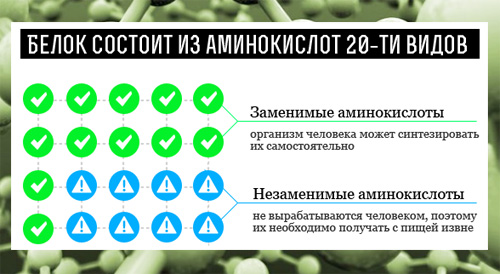
How much protein do you need to use for normal functioning of various body systems?
Scientists have been searching for an answer to this question for decades. Given that in the 19-20 centuries, the daily protein requirement for the body ranged from 26 to 136 grams. This difference of opinion was also explained by the reactionary views of some scientists who acted at the direction of the government, and also by the inadequate consideration of all the factors that could change the daily need for protein in one direction or another.
Currently, 100-120 grams of protein per day is considered sufficient for a person. More precisely, this amount is displayed proportional to the ratio of protein to body weight, this is how you can determine the individual need for protein, based on the fact that for one kilogram of weight should be 0.8-1.1 grams of proteins. But, as we mentioned above, the right amount of protein for a person per day can vary.
![]()
For example, during physical or mental stress, the need for proteins increases, which is why a large role is played here by the lifestyle of each individual person, as well as his profession. About ten percent need to increase the protein diet for pregnant women, and for nursing mothers - by twenty.
If you lose weight, then you need to use daily 1.5-2 grams of protein per 1 kg of your weight. But remember that in one meal the amount of protein should not exceed 30 grams, otherwise the extra protein will not be absorbed by the body. If your weight is more than 100 kg, then do not consume more than 200 grams of protein per day.

What leads to a lack of protein in the body
When losing weight, lack of protein will affect the muscles and you will lose weight due to the muscles, but not due to fat. The lack of protein in the body leads to a number of pathological conditions that are associated with hormonal imbalances, deficiency of enzyme systems, as well as a number of other factors. A person develops alimentary (food) dystrophy, disrupts brain activity, worsens the work of the blood-forming organs, the liver, and many other systems.
The protein deficiency in the child’s body is very adversely affected: the baby is stunted in growth, physical and mental development. With a protein deficiency in the pituitary gland of the brain, a deficiency of specific cells also develops. The function of these cells lies in the production of somatotropic hormone, which is responsible for the growth of the child's body. With strong protein deficiency, there may even be death from dystrophy.
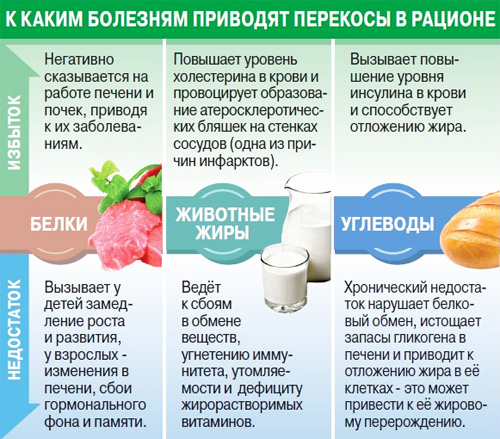
The main sources of protein are meat, poultry, fish, eggs, cheese, cottage cheese, and other meat and dairy products. This protein is called an animal. Peas, beans, nuts, contain vegetable proteins, which are necessary, first of all, for the construction and growth of all tissues and organs. Least protein in berries and fruits. It should be said that animal products contain an average of more proteins, in addition, they have a properly balanced amino acid composition, and this is important for normal digestion, for the absorption of protein components.
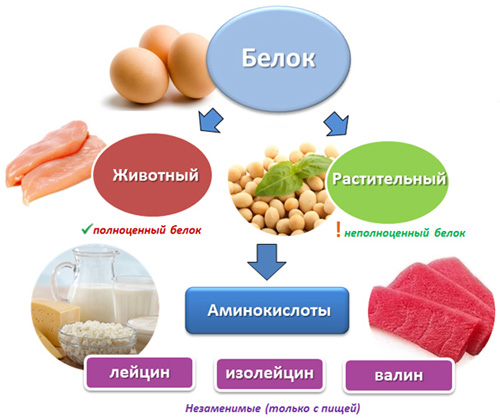
However, you should not overeat protein foods. When overeating in the intestine putrefactive processes, and this leads to the formation and absorption of toxic elements of decay in the blood.




